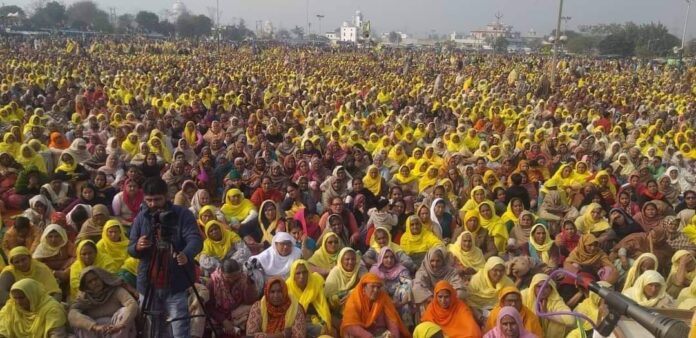The Mahila Kisan Diwas (Women Farmers Day) was celebrated at all the border points where farmers are currently camping to demand the repeal of reform-oriented farm legislation.
Massive assembly of women activists of farm organisation @Bkuektaugrahan at village Katehra in dist Fazilka, the native village @BJP4India leader Surjit Kumar Jayani on Mahila kisan Diwas #WomenFarmersAgainstFarmLaws pic.twitter.com/Keg7bcUwzH
— Gurpreet Ranwa (@gurpreet_ranwa) January 18, 2021
Without any solution in sight, nine rounds of talks with the Central Government are already over. The matter is also before the Supreme Court, which has set up a committee to investigate the issue. On January 26, protesting farmers scheduled a tractor rally.
Massive assembly of women activists of @Bkuektaugrahan at village Dhanolua in dist Barnala, the native village BJP leader Harjit Singh Grewal on Mahila kisan Diwas #WomenFarmersAgainstFarmLaws pic.twitter.com/l48QsJX780
— BKU_EKTA_UGRAHAN (@Bkuektaugrahan) January 18, 2021
In the nation, the number of female agricultural workers grew from 49.5 million in 2001 to 61.6 million in 2011, a jump of about 24 percent. But while employed in the fields, they increasingly face abuse and sexual assaults.
Today all women's organizations and networks (including MAKAAM) in Hyderabad held a rally as part of Mahila Kisan Diwas. #WomenFarmersDay #WomenFarmersProtest #RepealFarmLaws @AgriGoI @newslaundry pic.twitter.com/KhzZKen2qg
— MAKAAM (@MahilaKisan) January 18, 2021
Around 78 percent of women farmers in India face gender discrimination, according to a 17-country study conducted by Corteva Agriscience, in 2018.
Lets Celebrate the power and contribution of women in this war against tyranny and injustice. Lets Celebrate Mahila Kisan Divas.. Use this hashtag today.. #WomenFarmersAgainstFarmlaws pic.twitter.com/NbDxScEbfz
— SpeakUpForFarmers (@dhillonaman) January 18, 2021
Comrade @SubhashiniAli, AIDWA Vice President along with the delegation of #AIDWA from Kanpur at U.P. gate Ghazipur border Delhi farmers blockade to participate in the Mahila Kisan Diwas program. pic.twitter.com/9QyHt8giky
— Spartacus (@SDey83) January 18, 2021
According to a research by the Food and Agriculture Organization of the United Nations, in the Indian Himalayas, a pair of bulls works 1,064 hours, a man 1,212 hours, and a woman 3,485 hours in a year on a one-hectare farm. A research by the Indian Council of Agricultural Research in nine states shows that women’s participation in the production of major crops is up to 75 per cent.
AIDWA Kanpur delegation reaches Ghazipur border. They will all stay at the Mahila camp tonight to join Kisan Mahila Protest tomorrow. The delegation is being led by @SubhashiniAli and State Secretary Seema. pic.twitter.com/a6jD005wMy
— CPI (M) (@cpimspeak) January 18, 2021
Uttarakhand Mahila Manch Munsiari in support of the protesting farmers and demanding the repeal of the 3 farm laws. #WomenFarmersDay #WomenFarmersProtest #RepealFarmActsToday pic.twitter.com/LDqXkK3734
— MAKAAM (@MahilaKisan) January 18, 2021
At #SinghuBorder, it's an all-women stage and an all-women crowd today to mark Kisan Mahila Diwas.
Women in huge numbers at the protest site. #FarmersProtests pic.twitter.com/oxDoI6uToe
— Hemani Bhandari (@HemaniBhandari) January 18, 2021
For the same amount of labour put in the fields, women agri workers are paid almost half the wage as their male counterparts. For instance, in the samba crop season, a male agriculture labourer in Thanjavur, Tamil Nadu, gets paid a daily wage of Rs 500 to Rs 600 a day, but a woman farm labourer is paid just Rs 200 to Rs 400 a day. In states such as Bihar, it is much lower for women agri workers.
Today, January 18, thousands of farmers protesting against the three farm laws for the past 55 days in New Delhi, are observing #MahilaKisanDiwas #WomenFarmersDay. Read about the women farmers of India. @MahilaKisan @kkuruganti https://t.co/w5jfIGEKpL
— GaonConnection (@GaonConnection) January 18, 2021
NAPM stands in solidarity with the protesting womxn farmers and their demands for the #repeal of the three #FarmLaws, recognition as farmers, just legislations regarding land ownership, non-corporatization etc.#MahilaKisanDiwas @MahilaKisan @PARInetwork @aikscc @Kisanektamorcha pic.twitter.com/JZ8Dg4hwFQ
— NAPM India (@napmindia) January 18, 2021
As women working in farms and associated with the ongoing farmer movement rallied and marched across the country today to bring to light their contribution as farmers, SOLIDARITY from the women of Mikir Bamuni, Assam fighting the corporate-slave State #WomenFarmersDay pic.twitter.com/bgpMKpmlS2
— MAKAAM (@MahilaKisan) January 18, 2021
Outside Pune collector's office #WomenFarmersDay #WomenFarmersProtest #RepealFarmLaws pic.twitter.com/DEFTv4lbpa
— MAKAAM (@MahilaKisan) January 18, 2021
Despite participating in all agricultural activities, barely 13 per cent of women in the agriculture sector own land due to the patriarchal nature of our society. Because they do not have ownership, women are not recognised as farmers. In the absence of such distinct recognition, women cultivators remain ineligible for several schemes that state and central governments have announced for improving the status of the agriculture sector.



























